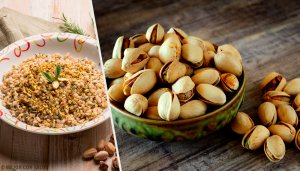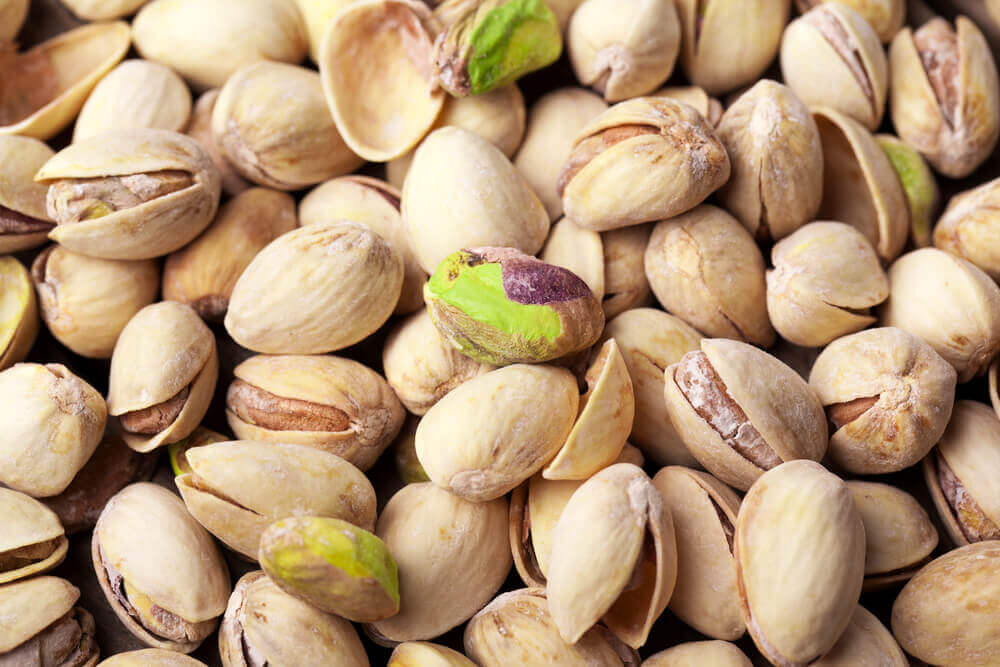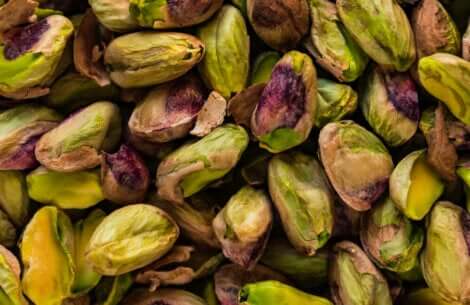The Incredible Benefits of Eating Pistachios Every Day


Written and verified by the pedagogue in physical education and nutritionist Elisa Morales Lupayante
Eating pistachios every day is a habit that some people have. They believe that by regularly incorporating this food, in moderate amounts, into their diet, they can make their diet more complete and healthier.
If you are curious about the benefits of consuming pistachios, then read on, because here are some interesting facts.
Pistachios, rich in monounsaturated fats
Experts from the Spanish Nutrition Foundation (FEN) say that pistachios are a source of: unsaturated fatty acids, monounsaturated fatty acids, fiber, calcium, magnesium, zinc, potassium, phosphorus, iron, thiamine, vitamin E and folates.
They also say that “one serving of pistachios covers 15% of the recommended daily intake of phosphorus, a mineral that contributes to the maintenance of normal bones”.
Although all nuts are very healthy and nutritious foods, pistachios are notable for being a good complement to the diets of people who need to gain weight in a healthy way.
Pistachios are one of the nuts with the highest amount of calories, therefore, they have a high content of unsaturated fats, especially monounsaturated fats.

Why eat pistachios daily?
While it is true that not everyone should eat pistachios every day to stay healthy, some people can benefit greatly from their consumption, such as people with problems in the skeletal system, people with low weight and patients with cardiovascular diseases.
1. They promote good cardiovascular health
Due to their nutrient and antioxidant content, pistachios are a food that can contribute to cardiovascular health. They contain phytosterols, arginine, resveratrol and lutein, and so can:
- Reduce high blood pressure
- Reduce cholesterol
- Care for the muscles of the heart
- Prevent arteriosclerosis.
2. They help prevent migraines
Pistachios contain magnesium, a mineral that, among other things, regulates the function of muscles throughout the body (including the heart) and nervous system, blood sugar levels, and blood pressure. It also helps build protein, DNA and bone mass.
According to experts from the National Institutes of Health:
“Migraine sufferers sometimes have low levels of magnesium in the blood and other tissues. Several minor studies indicate that magnesium supplements may reduce the frequency of migraines somewhat. However, magnesium should only be taken for this purpose under the supervision of a physician.”
3. They contain antioxidants

This nut contains high levels of antioxidants like vitamin C, vitamin E, selenium and resveratrol. These nutrients protect us from the damage caused by free radicals, both at the cellular level and externally. This prevents premature aging and keeps the skin healthy and well nourished.
3. Muscle health
Due to their potassium content, pistachios are good for your muscles and for maintaining a good physical performance. Eating them improves contraction, nerve transmission and also the elimination of retained fluids.
4. They have anti-diabetic properties
Pistachios are the best nut for preventing type 2 diabetes, thanks to their beta-carotene, procyanidins and fiber content. According to some studies, regular consumption reduces blood sugar levels and improves insulin resistance.
5.They help your eyesight
Because they contain lutein, riboflavin and zeaxanthin, pistachios are also good for maintaining good eye health. This makes pistachios an excellent remedy for preventing and improving eye problems.
6. They help regulate intestinal transit
Pistachios are very rich in fiber, a nutrient that promotes and regulates intestinal function. In this way, and with a diet rich in fruits and vegetables, we can prevent constipation.
7. They help prevent anemia
Pistachios also contain iron, and so can help prevent Ferropenic anemia. However, we recommend following a varied diet and also consuming vitamin C (citrus fruits, peppers, etc.) to improve the absorption of iron.

How many should we eat a day?
Nuts are highly recommended options to complement the diet. However, they should be consumed in moderation, since some, such as pistachios, have a high calorie content.
In general, it is recommended to eat a handful of nuts a day. However, in the case of pistachios, it is recommended to eat about 50 of these nuts a day, which corresponds to 30 grams without the shells.
Also, we should remember that it’s best to eat them without salt to avoid excess sodium in the body, which would take away some of the benefits of this nut.
All cited sources were thoroughly reviewed by our team to ensure their quality, reliability, currency, and validity. The bibliography of this article was considered reliable and of academic or scientific accuracy.
- Dreher, M. L. (2012). Pistachio nuts: Composition and potential health benefits. Nutrition Reviews. https://doi.org/10.1111/j.1753-4887.2011.00467.x
- Mohammadifard, N., Salehi-Abargouei, A., Salas-Salvadó, J., Guasch-Ferré, M., Humphries, K., & Sarrafzadegan, N. (2015). The effect of tree nut, peanut, and soy nut consumption on blood pressure: A systematic review and meta-analysis of randomized controlled clinical trials. American Journal of Clinical Nutrition. https://doi.org/10.3945/ajcn.114.091595
- Kay, C. D., Gebauer, S. K., West, S. G., & Kris-Etherton, P. M. (2010). Pistachios Increase Serum Antioxidants and Lower Serum Oxidized-LDL in Hypercholesterolemic Adults. Journal of Nutrition. https://doi.org/10.3945/jn.109.117366
This text is provided for informational purposes only and does not replace consultation with a professional. If in doubt, consult your specialist.








